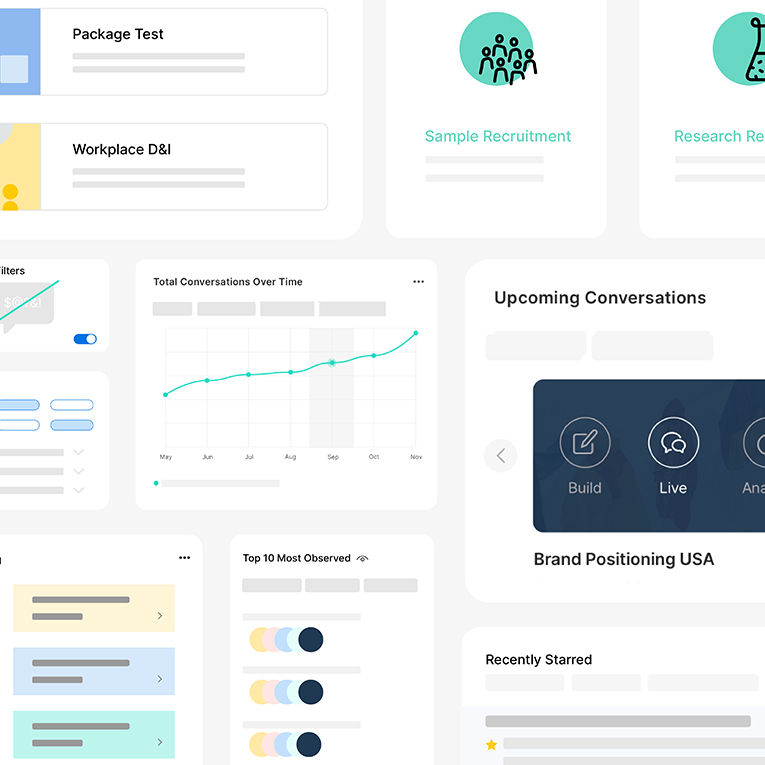.webp)
Trends
How to Calculate Your Sample Size Using a Sample Size Formula

.png)

.png)
Read More

.png)
.png)
.png)
Maria Noesi
November 25, 2021
.webp)
.webp)
.webp)
.webp)
.webp)
The Future of Policy Making: AI's Role in Politics
Democratizing AI: How 4,500 people shaped public policies using collective dialogue and AI. Learn how this innovative approach worked.

The decisions we make about how AI operates and behaves have profound implications for individuals, their interactions, and the overall evolution of our communities. The call for inclusivity and democratization of AI decision-making has never been stronger. Embracing a collective, participatory approach that incorporates diverse voices and perspectives is essential to harness the true potential of AI while minimizing unintended negative consequences.
As we move forward, we have to answer The Big Questions. Can we democratize AI? Is it possible for AI to bridge societal gaps? And to get more pragmatic, can AI write better policies to govern our society than humans themselves can?
The time has come to stop wondering and start answering. Andrew Konya, Remesh Co-founder and Chief Science Officer, had the privilege to be part of the team of experts from the University of Notre Dame, the University of Liverpool, and the AI & Democracy Foundation that collaborated to explore a new approach to creating policies that truly reflect the will of the public. The report, “Democratic Policy Development using Collective Dialogues and AI” reveals how combining technology and democratic processes can reshape policy development.
Read the related article over on Time.com.
The Back Story: How and Why This Research Came to Be
The catalyst for this research arose from OpenAI Inc.'s democratic inputs to AI grant program. The team recognized the need for a democratic process that incorporates public input and subject matter expertise to generate policies that are both representative and high in quality.
The primary goal of the study was to design an efficient democratic process for policy development. The core motivation was to increase the probability that the future aligns with the will of humanity. In other words, the stakes were high.
Read next: AI's Impact on Market Research
The Process
The team sought a method that could enable large-scale deliberation, combining collective dialogue with AI technology to facilitate meaningful input from diverse participants. Using the Remesh platform, the entire process took just two weeks and the team was able to quickly and economically engage over 4,500 individuals.
- Inclusive Participation and Collective Dialogues: For this research, the team harnessed the power of Remesh to conduct collective dialogues surrounding three topics. The process unfolded in several stages: participants were first educated on the issue, engaged in structured text-based deliberation, and then evaluated each other's responses. Individuals had the opportunity to express their opinions and engage in meaningful discussions on policy topics. Over 1,500 people representative of the U.S. population participated in each dialogue. This inclusive participation ensured that a wide array of perspectives were represented and considered.
- AI and Consensus Discovery: To efficiently discover areas of consensus, the team leveraged the capabilities of cutting-edge GPT4-powered tools. Through these tools, they enabled rapid ranking based on bridging techniques, providing valuable insights into public opinion and facilitating the identification of policy consensus.
- Crafting Representative Policies: Based on the collective dialogue and expert input, an initial policy was assembled using representative clauses derived from points of consensus. The process didn't stop there, though. The policy was refined further by incorporating feedback from the public, ensuring a comprehensive and inclusive approach to policy development.
Participants were blown away by the process. The majority found the experience enjoyable or meaningful, expressed trust in the process, and believed their contributions would be appropriately utilized. People want their voices to be heard. This reaction just goes to show the potential of collective dialogues to engage and empower individuals in shaping policies that affect their lives.
Results: Did it Work?
After crafting the final policies, the team didn’t stop there. They wanted to put them to the test: did they actually reflect the public’s will?
The team measured their support, and the answer was a resounding YES. The policy evaluation process generated policies that had overall support ranging from 75-81% and bridging support of 70-75% across different demographic groups. Knowing the current political climate, that’s nothing short of remarkable. The process was successful in generating policy guidelines that bridge divides on divisive issues such as vaccine information. Astounding!
The Power of Democratizing Policy Development
This innovative research has far-reaching implications for policymaking in general. By embracing the power of diverse perspectives in shaping AI, we can unlock remarkable opportunities for economic growth, societal progress, and ethical advancements. The involvement of individuals from various backgrounds, cultures, and experiences can lead to innovative solutions that address societal challenges and bridge existing gaps. Their insights can help mitigate bias, ensure fairness, and promote accountability in the development and deployment of AI systems.
This research exemplifies how combining technology and democratic processes can reshape policy development. With the utilization of platforms like Remesh and the power of AI, this approach enables large-scale engagement, consensus discovery, and the creation of policies truly grounded in the desires and needs of the public.
As we step into a future where policymaking becomes more transparent, inclusive, and democratic, we can anticipate a society that is better governed and more responsive to the aspirations and concerns of its members.
More

Remesh Evolution: AI-Powered Insights Platform Unveils Major Updates to Satisfy Market Demand for High-Quality, Human-Centric Research

.png)

.png)
Read More

.png)
.png)
.png)

.png)

.png)
Learn More

.png)
.png)
.png)


Stay up-to date.
Stay ahead of the curve. Get it all. Or get what suits you. Our 101 material is great if you’re used to working with an agency. Are you a seasoned pro? Sign up to receive just our advanced materials.



